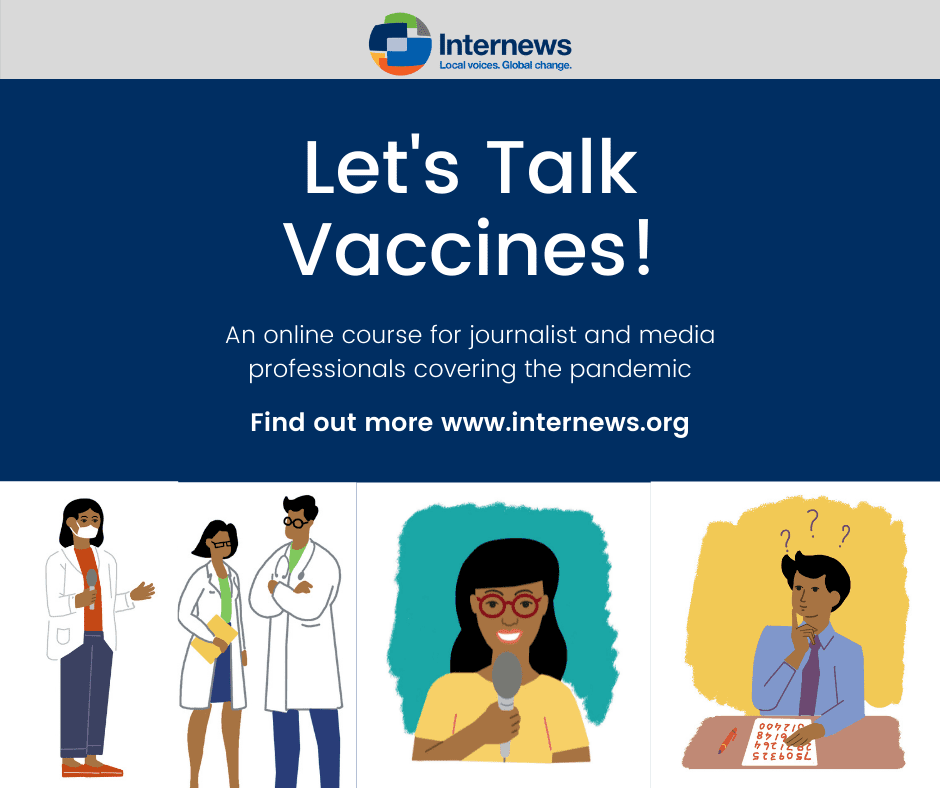
Course provides the tools journalists need to cover the most important news story of 2021!
(All graphics in the course are by Sean Croizier)
The biggest news stories of 2021 are about one topic: COVID-19 vaccines. To better support and equip journalists to report on vaccines now and in the future, Internews has launched Let’s Talk Vaccines, an interactive e-learning course in five parts. Each of these handles a distinct facet of the story: vaccine science, access to the vaccine, the logistics of rollout. The course also addresses how journalists can build vaccine confidence through their reporting. A final module guides journalists through the resources and sources to trust and use as they continue to follow this story.
“COVID-19 dropped into journalists’ lives and demanded their urgent attention. At a certain point it was clear there was a vaccine on the horizon – an equally challenging story – but there was time to be thoughtful and to proactively map out the elements of the story,” says Ida Jooste, Internews’ Senior Health Media Advisor. “This is how Let’s Talk Vaccines came about.”

Let’s Talk Vaccines
A free course to help journalists translate the language of vaccine science and the promise of vaccine access into compelling human stories.
Professor Salim Abdool Karim, Columbia Mailman School of Public Health epidemiologist and director of the Centre for the AIDS Programme of Research in South Africa (CAPRISA) says that journalists play a pivotal role in the global vaccine roll-out.
“It is a calling to be fact-providers, to explain the uncertainty amidst the facts and to help society come to terms with its harsh reality of those who spin and camouflage the truth,” says Karim, who joined Internews health advisors in launching the course May 19.
The course is designed to provide journalists with helpful information on navigating vaccine terminology, tips on managing looming deadlines and fast-tracking research, and exercises to help test course knowledge and improve skills.

“I wanted to present fact-based, accessible information in an engaging way,” says Adele Baleta, course co-author, and Internews Pandemic Media Mentor. “The idea is that the content is anchored with fun exercises that keep the attention of the course participant. This is a move away from a webinar-based approach to material that is more hands-on and very interactive.”
Internews Asia Health Media Advisor and course co-author, Dr. Jaya Shreedhar, says that journalists who take the course can expect to walk away with a sound grasp of vaccine science, as well as story ideas about the many public health and human rights aspects of access to diagnosis, treatment, immunization and recovery.
“Complex, tricky issues like vaccine confidence and uptake are explained in detail and depth, so that you can go beyond hot takes and quick headlines, offering your audiences insightful reads and knowledgeable, empathetic, journalism,” says Kate Thomas, also a course co-author and Internews Pandemic Media Mentor.
“The modules show how to remove jargon and translate vaccine science so that the science is made more accessible to participants’ audiences. There are story ideas and tips to navigate the complexity of the science and to ensure that misinformation most often about vaccine safety is not inadvertently spread by reporters and others,” says Baleta.
Coinciding with the launch of Let’s Talk Vaccines, Internews is launching a separate complementary course called Let’s Talk COVID-19, a focus on the disease caused by the novel coronavirus.
“The vaccine story is with us for a long time still to come,” says Jooste. “Journalists have a role to play that is just as critical as that of scientists and researchers.”
“It is a humanitarian imperative to the media and beyond, that all populations are inoculated if we are to control and hopefully eradicate this deadly infectious disease,” emphasizes Karim.
Register and complete the courses: